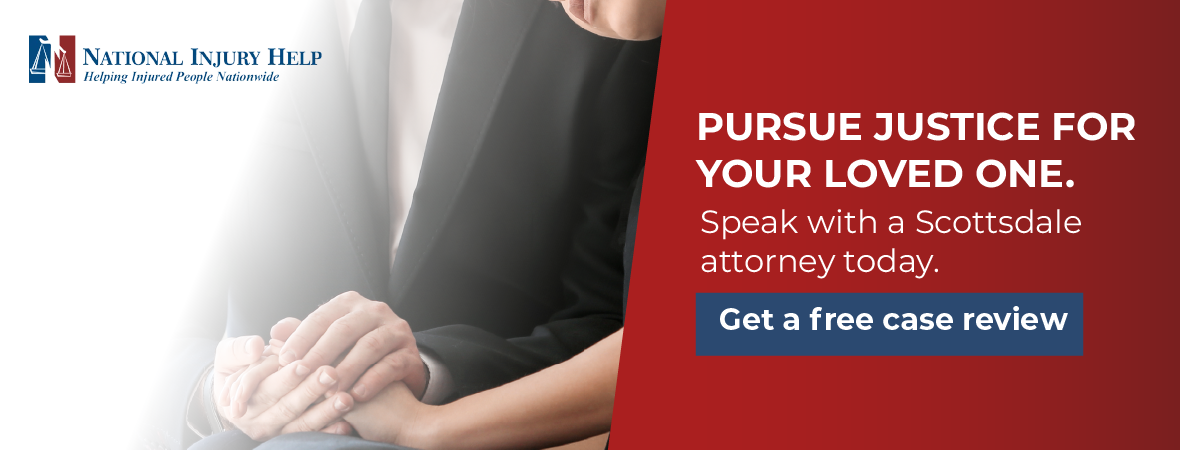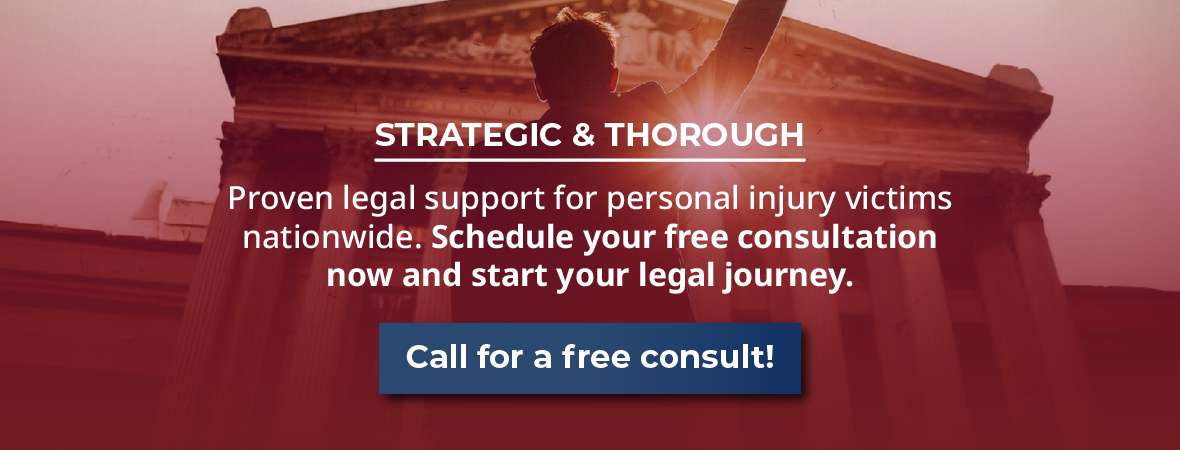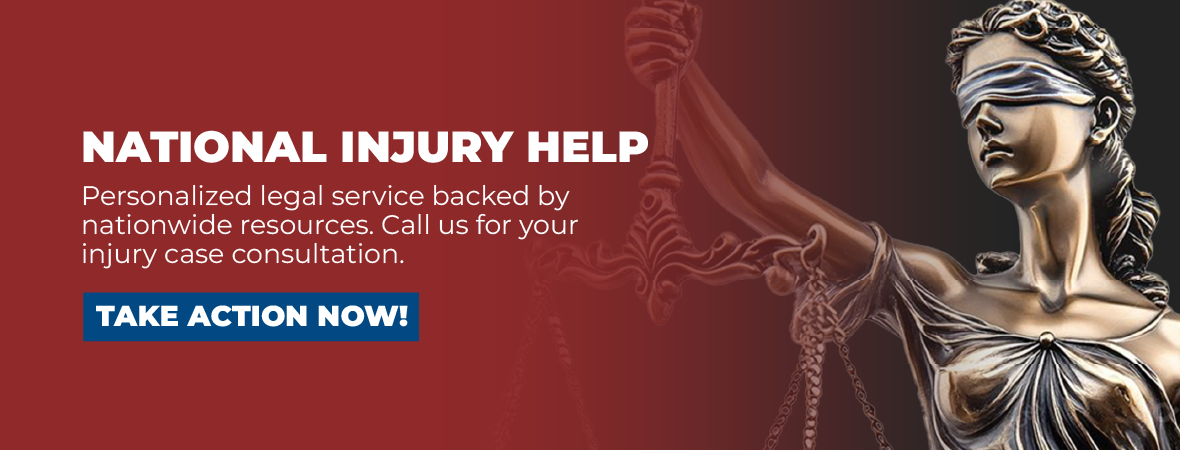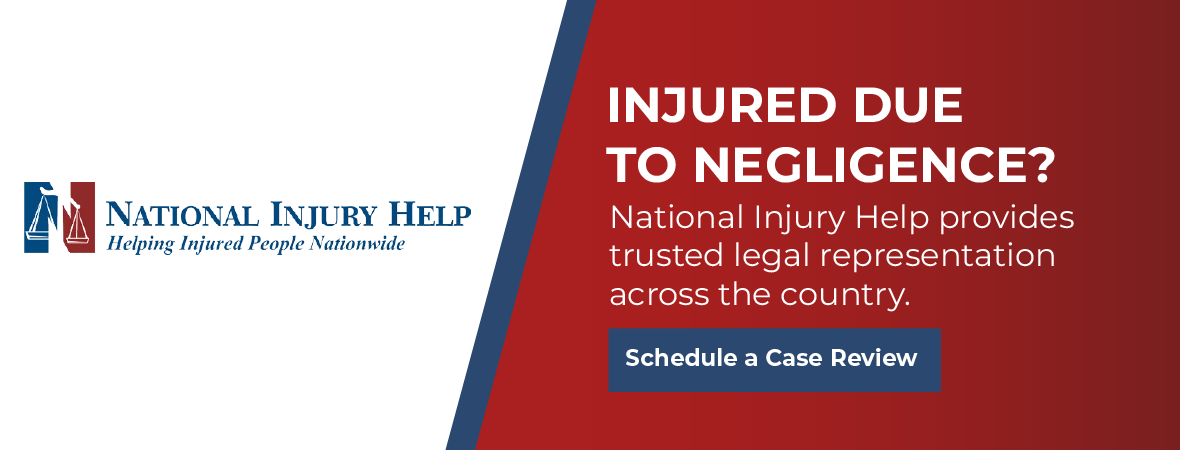Losing a loved one because of someone else’s actions is heartbreaking. Contact National Injury Help by calling 1 (800) 214-1010 today. We are here to guide your family with care and help you seek the justice your loved one deserves.
Losing a loved one without warning hurts in ways words can barely cover. Everything feels upside down. You may wake up each morning expecting to hear a familiar voice, only to remember the awful truth. We know that pain because we have walked beside Arizona families who felt it. We also know that bills, paperwork, and questions do not stop just because your world did. Our team at National Injury Help is here to guide you through each legal step while you focus on healing.
A death is called “wrongful” when it happens because another person or company was careless, reckless, or intentionally harmful. Arizona law says your family has the right to ask for money to replace income, cover funeral costs, and recognize the love that was taken away. When we use the courts to do that, we are not putting a price on a life. We are holding the wrongdoer accountable and giving your family the tools needed to rebuild.
Working with a local Scottsdale wrongful death attorney matters. We know the judges in Maricopa County Superior Court, we recognize insurance adjusters by name, and we can meet you near your neighborhood or even in your living room if travel feels hard.
What Qualifies as Wrongful Death in Arizona?
Arizona law defines wrongful death under ARS § 12-611. It says a death is considered wrongful when it is caused by someone else’s wrongful act, neglect, or failure to act.
This means that if your loved one would have had the right to file a personal injury claim if they had survived, then their close family members or legal representatives can file a wrongful death claim on their behalf.
The goal is to give families a way to seek justice and compensation when a death was preventable.
Scottsdale Wrongful Death Attorney Explains Types of Wrongful Death in Scottsdale
Wrongful death can happen in many different situations. Here are some common examples that may help you understand where your situation fits. These are based on real issues people face every day in Scottsdale and across Arizona.
1. Car, Truck, and Motorcycle Accidents
Traffic accidents are one of the leading causes of wrongful death in Arizona. Busy roads like Loop 202, University Drive, Broadway Road, and Rural Road in Scottsdale see many serious crashes. If a driver was speeding, texting, running a red light, or driving under the influence, and someone died as a result, that could be a wrongful death case.
2. Pedestrian and Bicycle Accidents
Scottsdale has a large population of walkers and bikers, especially near popular areas like Old Town Scottsdale and along the Indian Bend Wash Trail. When drivers fail to stop at crosswalks or do not pay attention, pedestrians and bicyclists can be seriously hurt or killed. These are tragic but common examples of wrongful death.
3. Workplace Accidents
Not all wrongful death cases involve traffic. Job sites, especially in construction or warehouse settings, can be very dangerous. Falls, equipment malfunctions, or unsafe work environments may lead to fatal accidents. If your loved one died while working, and the company failed to provide proper safety measures, it may be a wrongful death case.
4. Violence or Assault
Sometimes, wrongful death results from acts of violence. If someone is killed due to an assault, shooting, or drunk-driving incident, the family can still take civil action even if a criminal trial is going on. A civil lawsuit looks at responsibility in a different way than a criminal court, and you can often file both.
5. Dangerous Products or Property Conditions
Faulty products or unsafe properties can also cause deadly accidents. This could include a defective gas appliance that causes an explosion, a broken railing that leads to a fall, or poor lighting and security in a building that results in an attack.
Property owners and product manufacturers have a duty to keep people safe. If they fail to do that, and someone dies, the family may file a wrongful death claim.
What Makes a Wrongful Death Case Different from a Criminal Case?
A wrongful death case is filed in civil court, not criminal court. The goal of a wrongful death claim is not to put someone in jail but to get financial compensation for the family.
This money can help with medical bills, funeral costs, lost income, and the emotional pain of losing someone you love. Even if the state decides not to press criminal charges or if the person is found not guilty in a criminal trial, the family can still file a civil case.
The legal standards are different. You don’t have to prove guilt “beyond a reasonable doubt,” you only have to show that the other person was more likely than not to be responsible.
Who Can File a Wrongful Death Lawsuit in Scottsdale?
When a loved one dies because of someone else’s mistake or wrongdoing, the law gives certain people the right to take legal action. A wrongful death lawsuit allows families to seek justice and financial support. But not everyone can file a claim. Knowing who is allowed to file helps avoid confusion, prevents family disagreements, and makes sure no one misses their chance to act.
Who Is Eligible to File?
Arizona law lists specific people who may file a wrongful death lawsuit. The order of priority matters:
- Surviving Spouse: The husband or wife of the person who died is first in line. They can file alone or with other family members.
- Children: If there is no spouse, the biological or legally adopted children of the deceased may file the lawsuit. Adult children have the same rights as minors.
- Parents or Legal Guardians: If there is no spouse or child, the parents of the deceased may file a claim. This includes adoptive parents or legal guardians.
- Personal Representative: If no eligible family member files, the personal representative of the estate may file the lawsuit on behalf of everyone who is entitled to receive damages. This person is usually named by the court.
What Happens When Multiple People Are Eligible?
If more than one person is legally allowed to file, they must either file the lawsuit together or agree that one of them will file for all.
For example, if both a surviving spouse and adult children want to sue, they should combine their efforts into one case. This avoids delays, keeps costs down, and presents a united case in court.
Who Is Not Allowed to File?
Siblings, grandparents, and other relatives cannot file a wrongful death claim unless they are the official personal representative of the estate. The law is clear about who has the legal right to bring a case.
Special Rules for Minors
If a child wants to file a wrongful death lawsuit, they cannot do it alone. A parent, legal guardian, or court-appointed conservator must handle the case for them. Our team helps families complete this process correctly so the child’s rights are fully protected.
If you have questions about who can file, we are here to help you understand your options and guide you every step of the way.
Compensation in a Wrongful Death Case
When a loved one dies because of someone else’s actions, no amount of money can ever truly make things right. Nothing can bring back the warmth of their voice, the comfort of their presence, or the plans you made together.
But financial compensation can help ease the burdens that come with such a painful loss. It can help you pay bills, provide for children, and find stability during a very difficult time. In legal terms, this financial recovery is called damages. There are different types of damages in a wrongful death case, and each serves a unique purpose.
Economic Damages
Economic damages are the financial losses caused by the death. These are the easiest to measure because they are tied to real numbers like receipts, bills, and income records. They include:
- Medical Expenses: If your loved one received medical treatment before they passed away, you can recover those costs. This might include ambulance fees, emergency room care, surgeries, hospital stays, prescription medication, and hospice care. Even a short hospital stay can create overwhelming bills.
- Funeral and Burial Costs: Funeral services, cremation or burial, headstones, transportation, and cemetery plots are all expensive. These costs often arrive quickly, at a time when families are still in shock. The law allows you to be reimbursed for these reasonable final expenses.
- Lost Future Earnings and Benefits: If the person who died was working or expected to earn money in the future, your family may recover what they would likely have earned over time. This includes their wages, salaries, bonuses, health insurance benefits, retirement contributions, and more. Economists may estimate how much your loved one would have earned based on their age, career, education, and expected lifespan.
- Loss of Household Services: Many people contribute to their households in ways that are not part of a paycheck. These include cooking, cleaning, childcare, lawn care, home repairs, and managing bills. When these tasks are lost, families often have to pay others to take over. These costs can also be part of your claim.
Non-Economic Damages
Non-economic damages are harder to measure. They relate to the emotional and personal loss suffered by the surviving family. These damages do not come with receipts, but they are very real and just as important.
- Pain and Suffering of Survivors: This covers the deep sorrow, grief, and mental anguish that follows a sudden and unexpected loss. It recognizes how your life has changed and how your emotional health has been affected.
- Emotional Distress: This goes beyond sadness. Some people suffer anxiety, depression, sleep problems, or even post-traumatic stress after losing someone close. These emotional impacts are often supported by medical or counseling records.
- Loss of Companionship and Guidance: This refers to the love, support, encouragement, and life lessons that are now missing. Spouses lose partners. Children lose parents and mentors. Parents lose the chance to see their children grow. These losses are felt every day, in missed birthdays, graduations, weddings, and simple conversations.
Punitive Damages
Punitive damages are not awarded in every case. These are special payments meant to punish someone for extreme or reckless behavior. They are designed to send a message that certain actions are unacceptable.
Examples include a drunk driver speeding through a red light or a company ignoring serious safety hazards. The goal of punitive damages is to stop others from making the same dangerous choices in the future.
How Courts Calculate Compensation
Courts look at many factors to decide how much compensation is fair. These include the age, health, and job skills of the person who died. They also consider how many people relied on them for support. Experts like economists may explain wage growth and life expectancy. Therapists or counselors might describe the emotional effects on the children or the spouse.
Each case is unique. A judge or jury uses all the evidence to choose an amount that helps the family rebuild, meet future needs, and move forward with dignity.
How a Scottsdale Wrongful Death Attorney Can Help
Losing someone you love is heartbreaking. When that loss was caused by someone else’s carelessness, the pain can feel even worse. You may be dealing with shock, grief, and confusion, all while trying to make big decisions you never thought you would face. Medical bills may start arriving. Funeral costs pile up. Insurance companies may start calling. All of it can feel like too much to handle at once.
That is where a wrongful death attorney comes in. At National Injury Help, we step in to ease your burden. You do not have to go through this alone. Our team offers support, guidance, and strong legal action so your family can focus on healing.
Here’s how we help:
We Offer Emotional and Legal Guidance
When you are grieving, it is hard to think about legal steps. That is completely normal. We begin by listening. Every situation is different, and we take time to hear your story and understand what your family is going through.
Once we know the details, we will explain your rights in plain and clear terms. You do not need to know legal terms or court procedures; that is our job. We take care of paperwork, phone calls, and filing deadlines. If you are asking, “What do I do next?” We will answer each question with patience and care. We are here to take the pressure off your shoulders so you can take things one day at a time.
We Investigate the Cause of Death
A strong case starts with strong evidence. As soon as you hire us, we begin looking into what happened. Time matters. The sooner we act, the better our chances of collecting the proof needed to support your claim.
Our legal team gathers:
- Police and accident reports
- Medical records
- Video footage from nearby cameras
- Photos from the scene
When needed, we work with experts who help us understand exactly what caused the death. For example:
- Accident reconstruction professionals help show how a crash happened.
- Safety engineers examine faulty equipment or dangerous property.
- Medical experts explain how injuries develop over time.
Every small detail adds clarity. Together, they help us build a clear timeline and show exactly how the loss occurred.
We Prove Responsibility
In wrongful death claims, we need to show that someone else’s actions, or failure to act, led directly to the death. This could be a drunk driver, a careless doctor, a property owner who ignored hazards, or a company that sold a dangerous product.
To prove liability, we gather evidence that shows:
- The person or company owed a duty of care (like a driver obeying traffic laws or a store keeping walkways safe).
- They broke that duty through negligence or recklessness.
- That breach caused the fatal injury.
- Your family suffered real losses as a result.
Sometimes, the defense will try to argue that your loved one was partly at fault. This is called comparative fault. When that happens, we step in quickly with the truth. We use facts, expert testimony, and witness accounts to make sure blame stays where it belongs.
We Handle Insurance Negotiations and Court Cases
Insurance companies do not like to pay large settlements. They often start by offering less than what your family truly needs to move forward. That is why having a fatal accident lawyer on your side in Scottsdale matters so much.
From the first phone call to the last letter, we talk to the insurance adjusters for you. We make sure they see every piece of evidence and understand how this loss has affected your life. We push back on low offers and fight for full compensation.
If the insurance company refuses to be fair, we do not stop there. We are ready to take your case to court. Our trial team prepares everything:
- We filed the lawsuit in Maricopa County Superior Court.
- We handle all pretrial motions and discovery.
- We conduct depositions and talk to witnesses under oath.
- We present your case to a jury using clear, honest storytelling and strong evidence.
And through every step, we keep you updated in plain, easy-to-understand language. You will never be left wondering what is going on or what happens next.
Scottsdale Wrongful Death Attorney Explains the Wrongful Death Claim Process in Arizona
The road from consultation to settlement follows clear steps we can walk together.
- Step 1 – Initial Consultation: Bring any police reports, medical bills, and photos. We discuss timelines, costs, and goals at no charge.
- Step 2 – Investigation and Documentation: We order records, interview witnesses, visit scenes, and preserve evidence before it disappears.
- Step 3 – Filing the Claim or Lawsuit: We may first present a demand to the insurance carrier. If talks stall, we file a civil complaint with the court.
Step 4 – Negotiation or Trial Preparation: Most cases settle after discovery, yet we build every file as if a jury will see it. This strong stance often leads to higher offers.
Step 5 – Settlement or Verdict: Once money arrives, we pay valid liens, deduct agreed fees, and distribute shares to heirs. We explain every number so you know exactly where each dollar goes.
Statute of Limitations and Legal Deadlines in Arizona
Time limits protect fairness, but they can also cut off rights if you wait too long.
General Deadline: Two Years from the Date of Death
Most wrongful-death lawsuits must be filed within two years. Arizona Revised Statutes § 12-542 sets this limit.
Exceptions
- Claims against a government agency require a formal notice within 180 days and a lawsuit within one year.
- Delayed discovery of the cause of death may extend the deadline if hidden defects emerge later.
Importance of Acting Early: Evidence can fade, witnesses may move, and memories change. Early filings bring both emotional closure and stronger proof.
Challenges Families Face Without Legal Help
Trying to handle a wrongful-death claim alone adds new stress to deep grief.
- Dealing with Insurance Companies Alone: Adjusters may offer quick, low payments. They count on confusion and fear to close the file cheaply.
- Emotional Strain: Filling out legal forms while planning a memorial feels overwhelming. A lawyer lifts that weight.
- Risk of Missing Deadlines or Filing Errors: One misplaced signature can sink a case. We track every rule and form.
- Pressure from Other Family Members: Grief can spark disputes about money or blame. A neutral attorney keeps focus on justice and fair sharing.
FAQs About Wrongful Death Cases in Scottsdale
- How long do cases take to settle?
Most resolve in 6 to 18 months, yet complex trials may last longer. - What if the at-fault person is also deceased or uninsured?
We pursue their estate or look for other liable parties and insurance layers. - Can multiple family members file separate suits?
No, Arizona requires one combined action for all beneficiaries. - What happens if no suit is filed within two years?
The right to compensation is usually lost forever. - How do lawyers get paid?
We work on contingency, so we earn a percentage only if we win money for you.
Contact a Scottsdale Wrongful Death Attorney Today
No amount of money can replace a person. But fair compensation can help your family cover medical bills, funeral costs, lost income, and the emotional toll of the loss. It can give you breathing room to grieve without the added stress of financial pressure.
At National Injury Help, we treat every client with the care we would give our own family. We do not charge anything unless we win your case. Your first consultation is free, and there is no obligation to move forward unless you feel ready.
If you lost someone due to another’s actions, contact a Scottsdale wrongful death attorney today by calling 1 (800) 214-1010. We are ready to listen, ready to fight, and ready to help you take the next step.










